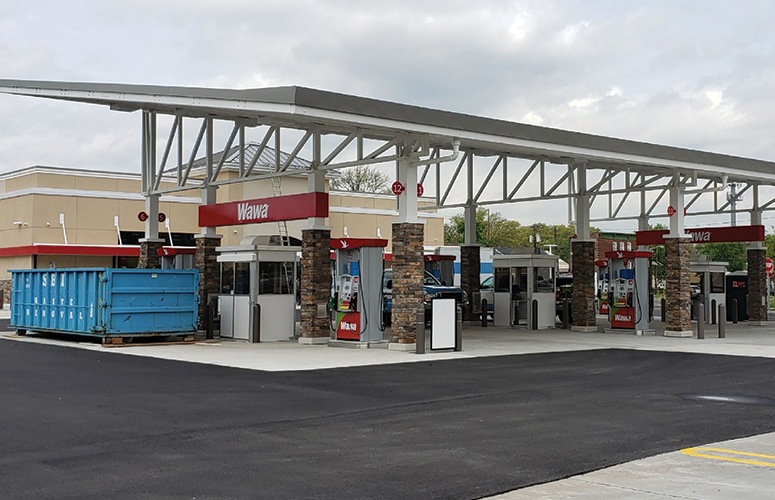
When it Comes to Environmental Remediation, Be Sure to Cover Your Bases
Buyers and sellers should be aware of evolving environmental regulations.
By Jim Pytell, Assistant Editor On Nov 12, 2018Environmental regulations have a large impact on the cost of doing business in New Jersey. As such, there is a balancing act that needs to be done when it comes to enforcing regulations to protect the environment and ensuring there are economic benefits for businesses, especially those that are good corporate citizens.
The importance of protecting the environment is obvious, and it can be looked at in a similar way to investing in our future workforce – hoping for a solid return on investment in the future. It only seems wise to make a concerted effort to protect the earth we walk on, water we drink and air we breathe, in order to secure a healthy future.
Prepare Yourself for the Negotiation
One aspect of environmental compliance includes site remediation, especially when it comes to a real estate transaction. Both the buyer and the seller need to ensure the site in question is up to the environmental standards set by both state and federal regulations, such as considering what contaminants may be on the property and what types of liabilities they may represent.
“If both parties (the buyer and seller) are going to be honest, fair and reasonable, there are ways to protect everybody,” says Wanda Chin Monahan, Esq., Law Offices of Wanda Chin Monahan, LLC.
She says that while she obviously wants to protect her client – say, a buyer – it doesn’t necessarily have to be at the expense of the seller.
“The whole idea is both parties want the property to be thoroughly investigated and remediated, because the [seller] has responsibility and a vested interest in making sure the remediation gets done properly. And, as the buyer, you don’t want any trouble once you start construction on the property. … Everyone wants the site to be remediated, and they want it done as quickly as possible and for the least amount of money,” Monahan adds.
Rodger Ferguson, LSRP, president of PennJersey Environmental Consulting, and president of New Jersey Licensed Site Remediation Professionals Association (LSRPA), says, “A well-experienced team of legal, Licensed Site Remediation Professionals (LSRPs) and engineers – among other specialists – is the key to any smooth transaction.
“Get a good real estate and environmental attorney who is fluent with site remediation on your project. Second, hire a LSRP at the outset if you are a buyer. The seller already has to have one if the site requires environmental remediation.”
Ferguson explains that the LSRP should be experienced in complex property transactions and can perform the due diligence for the buyer to understand data, the New Jersey Department of Environmental Protection’s (DEP) requirements, and develop a remedial strategy and cost estimate.
Do Your Due Diligence
Matrix New World Engineering Vice President of Environmental Investigations Robert Gascoyne, LSRP, PG, says that sellers should realize that the question of environmental issues will arise during almost every transaction. To prepare, he says they should collect and share all site environmental information, and realize that a deduction or retaining of some liability may be required.
“Buyers are coming into these transactions and often assuming risks they didn’t have before – the onus and cost is on the buyers to ensure that they are protected,” Gascoyne says. “Buyers obtain this protection primarily through complete and thorough due diligence. [For example,] many clients still find Pollution Legal Liability (PLL) coverage as an effective means to cover certain risks, using it to provide more environmental certainty to transactions. Although PLL insurance is not expected to insure known or expected costs, it can provide coverage for: discovery of previously unidentified contaminants on or migrating offsite, tort liability resulting from known or unknown contamination, and damages to the environment that result or resulted from historical operations and legal defense expenses.”
Ferguson says that he is seeing real estate deals happen now that he never thought would happen, based on the structure and contamination of the site.
“Solid due diligence by an LSRP is key so you can take the property and immediately move it to the next steps,” he says. “Buyers should ask what the property’s status is with the DEP timeframes in terms of enforcement and direct oversight. The buyer needs to know whether the site will be in direct oversight the moment the property is purchased. If the seller did not stay on top of DEP mandatory remediation timetables or hire an LSRP, direct oversight is automatic.”
A ‘New Day’ for Environmental Enforcement
Earlier this year, Attorney General Gurbir S. Grewal and DEP Commissioner Catherine McCabe declared it a “new day” for environmental enforcement in New Jersey. This coincided with the filing of six separate lawsuits aimed at recovering damages for the harm caused by pollution to properties, groundwater and waterways across the state, and to recover the costs the state has paid in conducting environmental clean-ups.
“This is the largest single-day environmental enforcement action in New Jersey in at least a decade,” Grewal says. “[This] is just the beginning. We are going to hold polluters accountable – no matter how big, no matter how powerful, no matter how long they’ve been getting away with it. And we’re sending a message to every company across the state: If you pollute our natural resources, we are going to make you pay.”
“The Murphy administration is making it clear that it takes environmental oversight and enforcement seriously,” Ferguson says. “DEP enforcement is back in a big way, and it is issuing Notices of Violation for missing regulatory timeframes.”
He adds that the DEP also has stepped up its level of inspection and review of environmental documents submitted by LSRPs, which may increase review times.
“I think everyone is keeping a close eye on what is happening and where environmental policy will go next. If you own and operate a facility, get into compliance,” Ferguson says.
Challenges on the Horizon
Knowing that potential changes and stricter environmental enforcement is happening in the state, there are a number of things to consider for those that may be affected as well as some challenges that will need to be tackled.
“A challenge that exists – which is not unique to this administration – is trying to figure out the incentives to spur redevelopment of the ‘corner gas station sites,’” says Marc Faecher, TRC Companies Inc., chief risk officer. “It’s almost as if in any redevelopment, the low hanging fruit has already been picked and you are left with secondary and tertiary site locations. It remains to be seen how we are going to spur that redevelopment and make it economically viable, but it is certainly one of the Murphy administration’s initiatives.”
Faecher continues, “In addition to tax abatements, I think what needs to happen is to make the liability protection afforded to the buyer more robust. You need to synchronize the protections you might get at the state and federal level, and essentially make it easier to get liability protection, not allowing someone to be sued by both the state and federal government.”
Ferguson says he is concerned with a potential legislative update to the Site Remediation Reform Act (SRRA), which was signed into law in 2009. He says that while the system has been working, there seems to be an effort to reverse some of the innovations of the SRRA and put more control back with the DEP.
“The SRRA created the LSRP program, which has reduced the state’s backlog on remediating contaminated sites,” Ferguson says. “The Act made more resources available for cleaning up sites by creating LSRPs to guide remediation programs and keep them on track with DEP timeframes. No one wants to go backwards and create longer waits to complete remediation. That would be bad news for redevelopment, the environment, and the people of New Jersey.”
Gascoyne adds, “Some of the proposed changes to the SRRA can have significant impacts on the rate of property transactions. Uncertainties exist about the changes in due diligence reporting and how these changes may stall transactions. Often, redevelopment is what drives or causes remediation, which we can all usually agree is beneficial, however, with concerns over reporting. Obligations, many of our clients anticipate a significant reduction in transactions resulting from the inability to effectively execute a mutually agreeable PSA.”
The Industry Remains Healthy
“It’s hard to remember a time when redevelopment was as active as it is today,” Gascoyne says. “In addition to regular redevelopment, we are seeing significant investments in infrastructure and waterfront redevelopment. Additionally, the next major milestone for many older sites is approaching, and – provided the funds are available – many PRCRs (Persons Responsible for Conducting Remediation) are proactively pushing toward closure. “
Ferguson echoes this sentiment, saying that the industry is busy, productive and is getting more sites remediated and back into the real estate market – something he believes will last as long as the market remains active.
“Some tweaks to the SRRA are likely and necessary, but as a whole, the Act and the LSRPs are working as designed and New Jersey is better for it,” he says.”
Related Articles:






